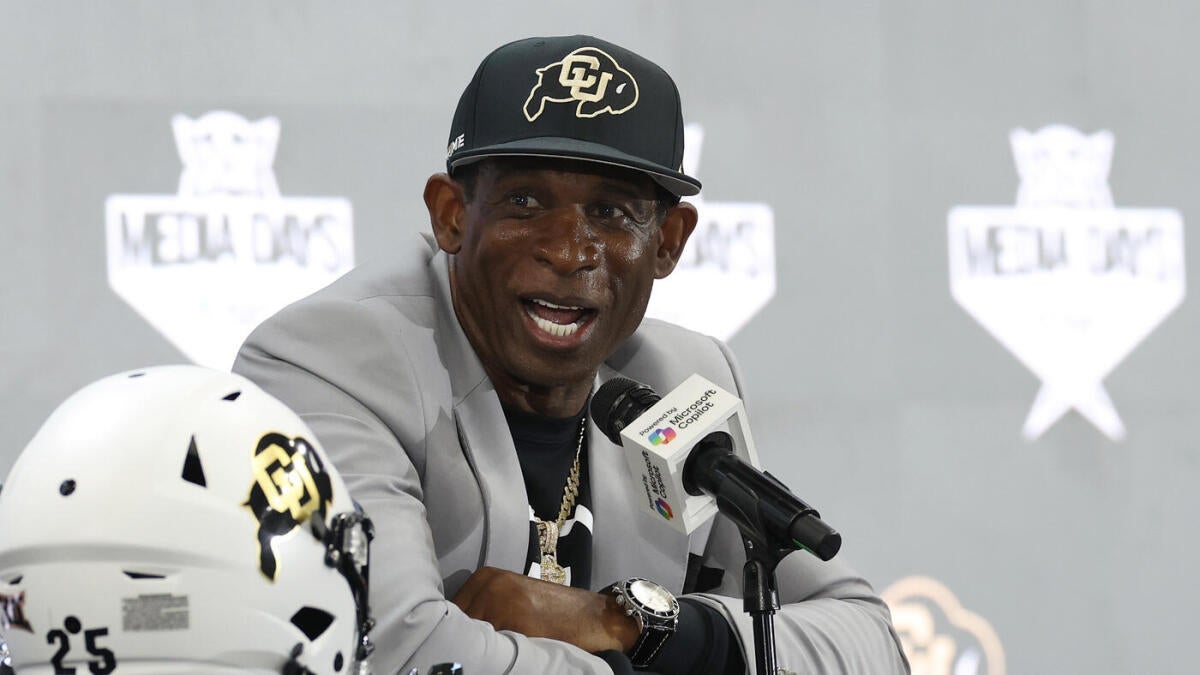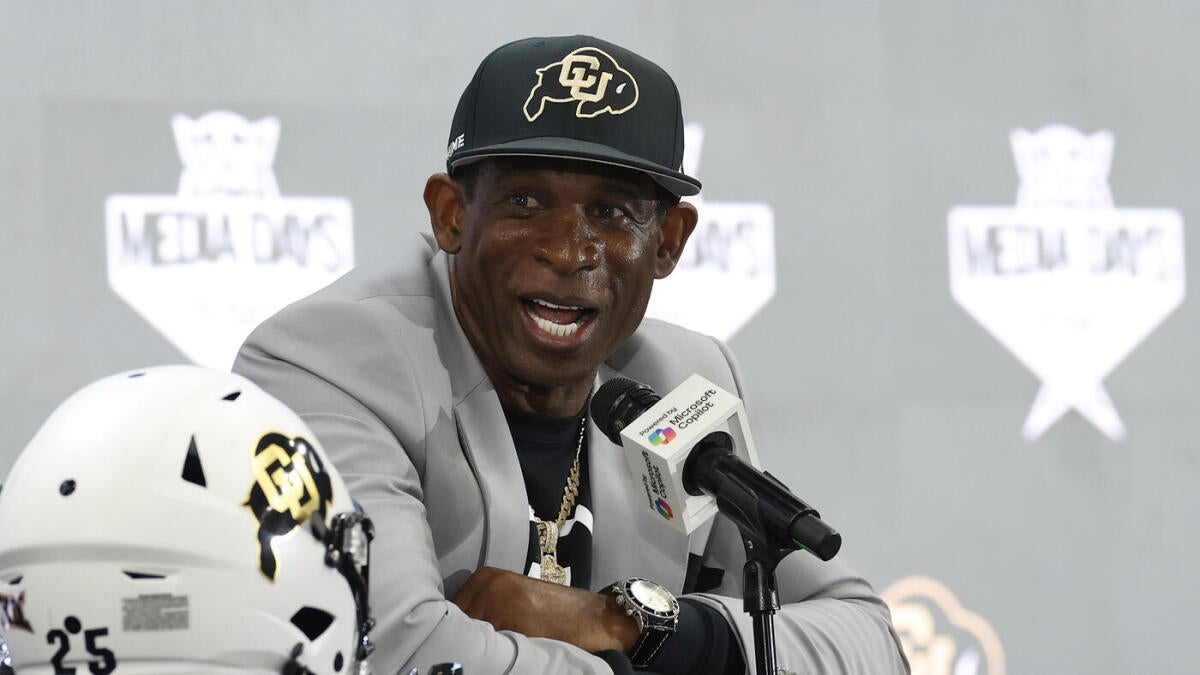Deion Sanders’ appearance at the 2025 Big 12 Media Days was a spectacle that transcended the typical pre-season hype. It was a carefully orchestrated performance that underscored his evolving role as a coach, a media personality, and a cultural icon. His presence at the event was not just about promoting his team; it was about setting the tone for his program’s future in the Big 12 and beyond.
Sanders’ entrance was a masterclass in commanding attention. The media swarmed him, cameras flashed, and the atmosphere crackled with anticipation. He acknowledged fellow coaches, a gesture that some saw as a sign of his growing maturity as a coach. This opening statement was a strategic move, designed to establish him as the central figure of the event. It was a reminder that Sanders is not just a coach; he is a brand, a persona that transcends the game itself.
One of the most anticipated moments was Sanders’ response to questions about his health. Having battled serious health issues in recent years, including complications from blood clots that led to toe amputations, his well-being has been a constant concern. He had missed practices and media events leading up to the Big 12 Media Days, fueling speculation about his readiness for the season. However, when directly asked about his health, Sanders deftly deflected, stating he wasn’t there to talk about it. This avoidance frustrated some reporters, who felt it was a legitimate topic given its potential impact on the team. However, it also underscored Sanders’ unwavering focus on controlling the narrative and keeping the attention on his team and their performance.
The quarterback situation at Colorado was another key topic of discussion. Sanders brought both Julian Lewis and Kaidon Salter to the event, a clear indication that the competition for the starting role remains fierce. This decision to bring both quarterbacks to media day has generated significant buzz and speculation. Some view it as a strategic move to keep both players engaged and motivated, while others see it as a sign of uncertainty and a lack of a clear frontrunner.
Sanders’ handling of the quarterback battle has been characterized by his trademark blend of confidence and showmanship. He has publicly praised both players, highlighting their strengths and emphasizing the importance of competition. However, he has also been careful not to reveal too much, keeping the media and fans guessing about his ultimate decision.
Sanders didn’t shy away from addressing the contentious issue of Name, Image, and Likeness (NIL) in college football. He didn’t mince words, blasting the current state of NIL, saying that spending decides who makes the College Football Playoff, calling the system unfair and unsustainable. His argument is that the teams with the deepest pockets have an unfair advantage, making it harder for programs like Colorado to compete at the highest level. This stance is likely to resonate with many coaches and fans who believe that NIL has created an uneven playing field, where financial resources outweigh talent and coaching. Sanders’ comments could be seen as a call for greater regulation and reform of the NIL system, aimed at creating a more level playing field for all programs.
For the past two seasons, Sanders has coached his sons, Shedeur and Shilo, at Colorado. Their presence on the team has been a significant part of the program’s narrative, adding a layer of family dynamics to the high-pressure world of college football. However, with Shedeur and Shilo now pursuing NFL careers, Sanders faces a new challenge: coaching without his sons.
The absence of his sons could have a significant impact on Sanders’ coaching style and the team’s chemistry. He will need to adapt to a new dynamic, relying on different leaders and establishing a new sense of camaraderie. However, it also presents an opportunity for Sanders to demonstrate his coaching acumen and prove that his success is not solely dependent on his family connections.
Colorado’s return to the Big 12 marks a significant shift for the program. After years in the Pac-12, the Buffaloes are now navigating a new conference with different rivals and a different competitive landscape. The Big 12 is known for its high-scoring offenses and passionate fan bases, creating a unique and challenging environment for Colorado. Sanders acknowledged the strength of the Big 12, giving “props” to other coaches in the league.
Sanders understands the importance of making a strong first impression in the Big 12. He knows that the Buffaloes will be under intense scrutiny, and that their performance in the upcoming season will be crucial in shaping their reputation in the conference. He is determined to prove that Colorado can compete with the best teams in the Big 12, and that they are not just a novelty act.
Deion Sanders is more than just a football coach; he is a cultural icon. His charisma, his style, and his willingness to speak his mind have made him a media magnet, attracting attention and generating headlines wherever he goes. This ability to command attention has been both a blessing and a curse for Sanders and his program. On one hand, it has brought unprecedented exposure to Colorado, attracting recruits and generating revenue. On the other hand, it has also created a circus-like atmosphere around the program, with constant media scrutiny and a never-ending stream of distractions.
Sanders has shown an uncanny ability to manage the media, using his platform to promote his program and control the narrative. He understands the power of social media, and he uses it to connect with fans and recruits. However, he also knows when to draw the line, refusing to answer questions that he deems inappropriate or irrelevant.
Deion Sanders’ journey at Colorado is far from over. He faces significant challenges, including navigating the complexities of NIL, adapting to a new conference, and proving that he can build a sustainable program. But he also has a unique opportunity to create a lasting legacy, to transform Colorado into a national powerhouse, and to redefine the role of the modern college football coach. His legacy hinges on his ability to translate his vision into tangible results on the field.
In conclusion, Deion Sanders’ appearance at the 2025 Big 12 Media Days was a performance that went beyond the typical pre-season hype. It was a statement of intent, a reminder of his unique ability to command attention, and a promise of what’s to come. While his detractors may dismiss him as all hype and no substance, it’s undeniable that Sanders has injected excitement and energy into college football. Whether he can translate that energy into wins remains to be seen, but one thing is certain: Deion Sanders will continue to be a force to be reckoned with, both on and off the field.












